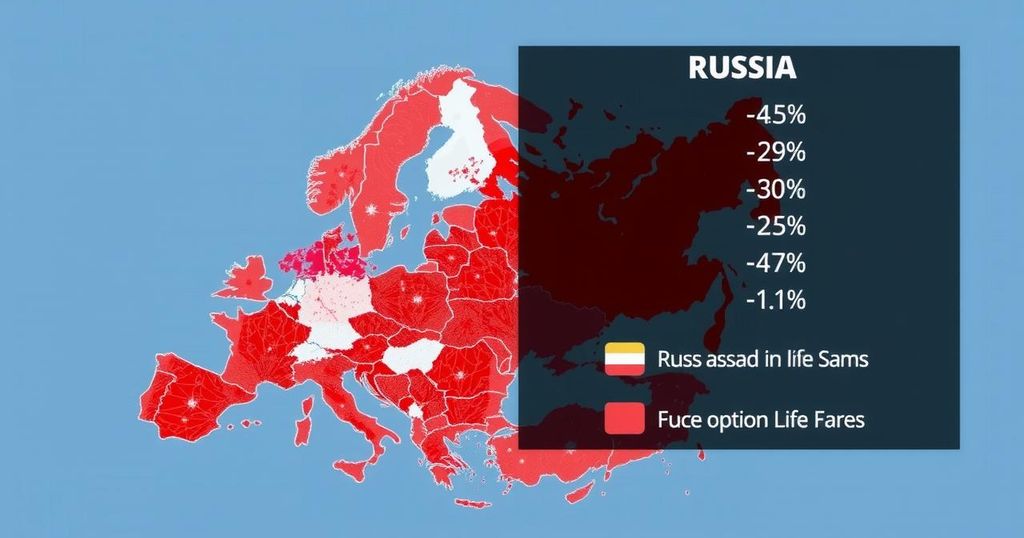The Fall of Assad: Implications for Russia’s Global Standing
The recent fall of Bashar al-Assad in Syria represents a significant blow to Russia’s prestige and strategic interests in the region. Following nearly a decade of military support, Assad’s reported flight to Moscow has prompted concerns over the fate of Russian military bases and undermined Russia’s global standing. As the Kremlin shifts focus to domestic priorities, the implications of this political upheaval remain profound.
In a significant turn of events, the fall of Bashar al-Assad’s regime marks a considerable setback for Russia’s influence in Syria. For almost a decade, Russian military might underpinned Assad’s leadership, but unprecedented developments have led to his reported flight to Moscow, where he is said to have been granted asylum. Amidst this turmoil, the Kremlin has expressed grave concern over the rapid unraveling of its strategic presence in the region, indicating a loss of prestige on the global stage.
The Russian foreign ministry announced its acute concern regarding the disintegration of Assad’s authority, recognizing it as a major blow to Russian foreign policy objectives. Initially, Russia’s military intervention in 2015 aimed to bolster Assad’s regime and reassert its dominance away from the Western influence. This move once appeared to be a triumph for Moscow, evidenced by President Vladimir Putin’s 2017 declaration of a successful mission in Syria following a visit to the Hmeimim air base.
In exchange for military assistance, Assad had granted Russia critical leases for its military bases in Syria. These locations provided Russia an essential foothold in the eastern Mediterranean and served as operational hubs for further military endeavors. However, with the regime’s collapse, questions arise regarding the future of these strategically vital installations. Russian officials have engaged with representatives of the Syrian opposition, who have assured the safety of Russian military assets, even as the bases are placed on high alert.
Historically, Assad has been Moscow’s closest ally in the Middle East, with significant investments made by the Kremlin to sustain his rule. Consequently, his overthrow complicates the narrative for Russian authorities, who are now searching for blame. State media have suggested that the Syrian army’s lack of resistance against opposition forces largely contributed to this sudden downfall. Such reflections highlight the Kremlin’s attempts to deflect responsibility amidst a deteriorating situation that may have lasting implications for Russian interests abroad.
Ultimately, the Russian state media has shifted focus to domestic concerns, such as the ongoing conflict in Ukraine, suggesting that the public’s priorities should remain closer to home. This redirection indicates a deeper uncertainty about the loss of influence in Syria, which underscores the stakes of Moscow’s entanglement in foreign conflicts. More importantly, this multifaceted crisis poses significant questions about the future trajectory of Russian foreign policy in the Middle Eastern political landscape.
The article revolves around the recent collapse of Bashar al-Assad’s regime in Syria, which has been underpinned by Russian military support since 2015. Russia’s involvement was crucial to maintaining Assad in power and asserting its role as a dominant power in global affairs, particularly in the Middle East. The abrupt shift in Syria’s political landscape has raised concerns about the stability and future of Russian military installations in the region, alongside the implications for Russia’s international prestige.
In summary, the fall of the Assad regime is a profound setback for Russia, challenging Moscow’s influence and strategic military presence in Syria. This development raises critical questions regarding the future of Russian military bases and its foreign policy objectives in the region. Furthermore, as the Kremlin grapples with this loss, it attempts to redirect the narrative to other pressing domestic issues, notably the conflict in Ukraine, signaling potential shifts in public focus away from international failures.
Original Source: www.bbc.co.uk




Post Comment